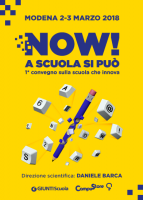I’m honored to have the following proposals accepted for the ISTE20 program. ISTE 2020 will be in Anaheim, California in June 2020. I will be leading two sessions, maybe more, if some of the waitlisted sessions are accepted!
Maker 2.0 – Now What?
You have “making” going on in your school, or maybe even a makerspace! Congratulations… but now what? This session will help educators, both teachers and administrators, build a roadmap for their own making and makerspaces programs that will succeed now and in the future.
- Scheduled:
- Tuesday, June 30, 9:00–10:00 am PDT (Pacific Daylight Time)
- Building/Room: Available in May
STEAM to the Future: The 4th Industrial Revolution is Here!
Let’s time travel fifty years forward to see what science, technology, engineering, and math will be like, and the prominent role that the arts, design ,and creativity will play. This session will provide entertaining and thought-provoking insight into the challenges of adapting today’s classroom and curriculum for the future.
- Scheduled:
- Wednesday, July 1, 8:30–9:30 am PDT (Pacific Daylight Time)
- Building/Room: Available in May
Waitlisted proposals
I was very excited about this new session on ethics, empathy, and educational technology. It wasn’t accepted, but is waitlisted, so maybe it will have a chance!
Ethics, Empathy, and Educational technology
Go beyond digital citizenship to innovative technology to help students develop ethics and empathy for others. Breakthroughs in AI, algorithm bias, bio-hacking, face recognition, digital assistants like Siri and Alexa, robotics, media manipulation like “deep fakes,” and digital fabrication offer interesting opportunities for students to learn about cutting edge of science and math, and how ethical decision-making can make the world a better place for all.
This session will dive into the role and responsibility of the educational technology community to offer be leaders in how students learn ethics. Ethical behavior is an outcome of identifying with other people, and students of all ages can learn about ethics in the context of cross-curricular projects that include both digital and physical components. This has always been part of school – we want students to understand how their behavior impacts others. But the new role of technology in every aspect of life expands this mandate.
In the past, ethics has been taught to younger children in the context of personal responsibility – knowing right from wrong, behavior, etc. As children grow up, they are exposed to a larger sense of the world – are laws fair, what is justice, how can we make good decisions as a local or global community. In this transition, the child gains a view of the world that grows from the self to the community.
However, the world is changing. There are now decisions to be made about the ethics of systems, of technology, and of inventions that have yet to be invented. How will our children learn about these? How will they make decisions and not feel powerless in the face of this uncertainty? And what can we as educational technology leaders do about this?
Other Waitlisted submissions (panels submitted by others)
- Bringing Bio into the Makerspace: Accessible BioFabrication and Biomaterial Explorations
- Hot or Not? Trending Topics in EdTech Judged by… YOU!



 Sylvia Martinez will be a spotlight speaker at ENVISION 2030: LEADERSHIP FOR LEARNING – the COSN Annual Conference.
Sylvia Martinez will be a spotlight speaker at ENVISION 2030: LEADERSHIP FOR LEARNING – the COSN Annual Conference.


 ICE 2018
ICE 2018


